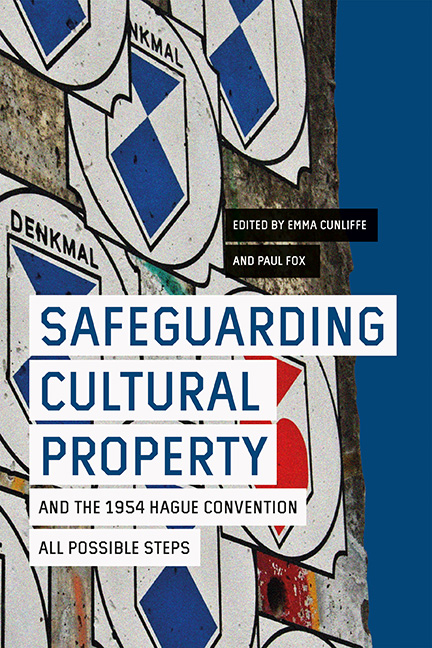Book contents
- Frontmatter
- Contents
- List of Illustrations
- List of Contributors
- Plate Section
- Acknowledgements
- List of Abbreviations
- Preface: The Blue Shield and the Protection of the World's Cultural Property – Preparing in Peace for Conflict
- Part I Safeguarding – Reassessing the Field
- Part II Historical Perspectives
- Part III Current Issues in Legal Implementation
- Part IV The Hague Convention in Practice Today: Tools and Approaches
- Appendix 1 The Hague Convention for the Protection of Cultural Property in the Event of Armed Conflict with Regulations for the Execution of the Convention 1954
- Appendix 2 Regulations for the Execution of the Convention for the Protection of Cultural Property in the Event of Armed Conflict
- Appendix 3 Resolutions of the 1954 Hague Conference
- Appendix 4 Second Protocol to the Hague Convention of 1954 for the Protection of Cultural Property in the Event of Armed Conflict 1999
- Appendix 5 Additional Protocols (1977) to the Geneva Conventions (1949) (Extracts)
- Index
- HERITAGE MATTERS
9 - Emerging Considerations for the UK's Domestic Implementation of the 1954 Hague Convention to Protect Museums and their Cultural Property Collections in the Event of Armed Conflict
Published online by Cambridge University Press: 26 May 2022
- Frontmatter
- Contents
- List of Illustrations
- List of Contributors
- Plate Section
- Acknowledgements
- List of Abbreviations
- Preface: The Blue Shield and the Protection of the World's Cultural Property – Preparing in Peace for Conflict
- Part I Safeguarding – Reassessing the Field
- Part II Historical Perspectives
- Part III Current Issues in Legal Implementation
- Part IV The Hague Convention in Practice Today: Tools and Approaches
- Appendix 1 The Hague Convention for the Protection of Cultural Property in the Event of Armed Conflict with Regulations for the Execution of the Convention 1954
- Appendix 2 Regulations for the Execution of the Convention for the Protection of Cultural Property in the Event of Armed Conflict
- Appendix 3 Resolutions of the 1954 Hague Conference
- Appendix 4 Second Protocol to the Hague Convention of 1954 for the Protection of Cultural Property in the Event of Armed Conflict 1999
- Appendix 5 Additional Protocols (1977) to the Geneva Conventions (1949) (Extracts)
- Index
- HERITAGE MATTERS
Summary
Museums, operating at the forefront of the daily struggle to preserve cultural property (CP), require increased proactive domestic planning for CP protection (CPP) if their collections are to survive future periods of armed conflict. Fortunately, CPP has developed as an international priority, emerging from cursory inclusion within the 1860s Lieber Code to full embodiment within the 1954 Hague Convention for the Protection of Cultural Property in the Event of Armed Conflict (‘the Convention’), its Regulations (‘Regulations’), and its two Protocols of 1954 and 1999 (together the Hague Convention). This chapter explores the adequacy of the proactive contingency measures put in place by the UK for the protection of museums following its 2017 ratification of the Hague Convention.
As ‘buildings whose main effective purpose is to preserve or exhibit … movable cultural property’, museums are included within the Convention Article 1 definition of protected CP (Article 1(b)). They may also receive protection under the Hague Convention when connected with ‘movable or immovable property of great importance’ or ‘very great importance’ to the nation (Convention Articles 1 and 8(1), respectively), or ‘cultural heritage of the greatest importance for humanity’ (Second Protocol Article 10). This includes significant collections of all kinds and national CP repositories of significance. Protection is most effective, however, if the CP that is to be designated is prioritised pre-conflict during proactive Hague Convention implementation.
Now a major international legislative instrument for CPP in the event of armed conflict, the Hague Convention's framework features legal obligations and optional strategies for states parties to safeguard CP in the event of armed conflict. Convention Article 3 requires states parties to arrange and rehearse safeguarding measures ‘in times of peace’ to protect their national CP ‘as they consider appropriate’. Second Protocol Article 5 ‘seeks to put flesh on the bare bones of Article 3 of the Convention … as a concise set of operational guidelines to the implementation of the obligation already imposed by Article 3 of the Convention’ (O’Keefe 2006, 249–250). This includes a non-exhaustive list of safeguarding measures to be undertaken in peace – all of which have direct relevance to museums and their collections: inventory production, preparation for emergency protection against fire or structural collapse, plans for adequate in situ protection of movable and immovable CP, preparation for the removal of movable CP, and the designation of competent authorities to manage these.
- Type
- Chapter
- Information
- Safeguarding Cultural Property and the 1954 Hague ConventionAll Possible Steps, pp. 151 - 168Publisher: Boydell & BrewerPrint publication year: 2022



